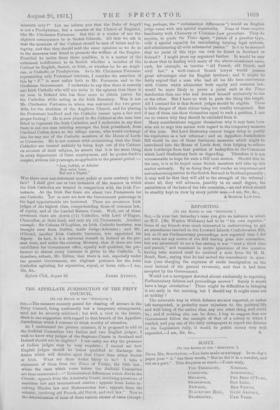THE, APPELLATE JURISDICTION OF THE PRIVY COUNCIL.
[To ,f1(76 EDITOR OP THE SPECTATOR."]
SIG,—The measure recently passed for clearing off arrears in the Privy Council, being confessedly but is temporary arrangement, need not be severely criticized ; but with a view to the future, there is one suggestion with regard to that branch of the Appellate Jurisdiction which I venture to think worthy of attention. As I understand the present measure, it is proposed to add to
the Judicial Committee two Indian and two English judges; I wish to know why judges of the Supreme Courts in Scotland and Ireland should not be eligible? I can easily see why the presence of Indian judges may be very requisite ; I cannot see how English judges should -be better qualified to discharge the duties which will devolve upon that Court than either Scotch or Irish. What are those duties likely to be ? I take a statement of them from the Times of Friday, the 18th inst., where the cases which come before the judicial Committee are thus enumerated :—" Ecclesiastical differences Which divide the Churclt; appeals from the Admiralty Court, involving questions of
maritime law and iuternational custom ; appeals from India in- volving Hindoo law and Mohammedan law ; appeals from the colonies, involving old French, old Dutch, and civil law." Now to the determination of none of these various classes of cases (except-
ing, perhaps, the " ecclesiastical differences ") would an English judge come with any special superiority. None of these require familiarity with Chancery or Common-Law procedure. They do require, to quote the Times again, " jurists of a peculiar type,. with a special capacity for assimilating varying legal systems, and administering all with substantial justice." Is it to be assumed that no jurist of this type can ever be found in Scotland or Ireland ? I might press my argument farther. It would be easy to show that in dealing with many of time above-mentioned cases, such, for example, as involve " old French, old Dutch, and civil law," a well-trained Scotch lawyer would possess great advantages over his English brethren ; and it might be fairly argued that a man who had all his life been conversant with Courts which administer both equity and common law, would be more likely to prove a jurist such as the Times desiderates than one who had devoted himself exclusively to one or the other. But I have no wish to push the thing this length. All I contend for is that Scotch judges should be eligible. There is little danger of their claims being too readily recognized. But if any of them can show themselves equal to such a position, I can see no reason why they should be excluded from it.
Many considerations suggest themselves why it may have been wise not to urge this matter with regard to the temporary measure of this year. But Lord Hatherley canuot longer delay to justify his reputation as a law reformer ; and an Appellate Jurisdiction Bill would be one of those fortunate measures which might be introduced into the Ilouse of Lords first, thus helping to relieve their Lordships from that position of lackeydban to the Commons which Lord Shaftesbury feels so degrading. Therefore it is not unreasonable to hope for such a Bill next session. Should this be the case, it is to be hoped some Scotch members will take up this matter seriously. By so doing they will render an important and not unbecoming service to the Scotch Bar and to Scotland generally ; it may well be that they will add to the strength of the tribunal ; above all, they will advance, possibly in no small degree, the assimilation of the laws of the two countries,—an end which should be steadily kept in view by every public man.—I am, Sir, &c.,
A SCOTC11 LAWYER.






























 Previous page
Previous page